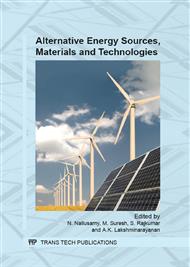p.803
p.809
p.815
p.823
p.828
p.833
p.838
p.843
p.848
A Modified Maximum Power Point Tracking Control for Bi-Directional Z-Source DC-DC Converter Based Solar Electric Vehicle
Abstract:
A solar electric vehicle is powered by photovoltaic arrays which allow for direct conversion of solar energy into electrical energy. Since space and weight are very limited with any vehicle, it is desired that the maximum possible amount of energy be obtained from the employed photovoltaic arrays. Every photovoltaic array has an optimum operating point, called the maximum power point (MPP), which varies depending on cell temperature and solar insolation level. This paper is focussed to find the mechanism best suited for employment in a moving vehicle to optimally track this point of maximum efficiency under rapid variation of solar insolation and adjust the operating point of the photovoltaic array accordingly. An integral part of any modern day electric vehicle is power electronic circuits comprising DC-DC converters for conversion and conditioning of electrical power. Recently, Z-source DC-DC converters show promising outcomes when integrated with photovoltaic array compared to conventional DC-DC converters. They provide larger range of output dc voltage, improve reliability and can reduce in-rush and harmonic current. A bi-directional Z-source DC-DC converter with a maximum power point tracking (MPPT) technique suitable for electric vehicle applications is developed to incur high electric power from photovoltaic array. The photovoltaic array output voltage is controlled and the maximum power point tracking is attained by controlling the duty cycle. The well known incremental conductance MPPT algorithm is modified by measuring the power in the middle of the sampling interval to prevent the bewilderedness during rapidly changing insolation condition. Computer simulation and experimental results are provided to establish the performance of the proposed system.
Info:
Periodical:
Pages:
828-832
DOI:
Citation:
Online since:
August 2015
Authors:
Keywords:
Price:
Сopyright:
© 2015 Trans Tech Publications Ltd. All Rights Reserved
Share:
Citation:


